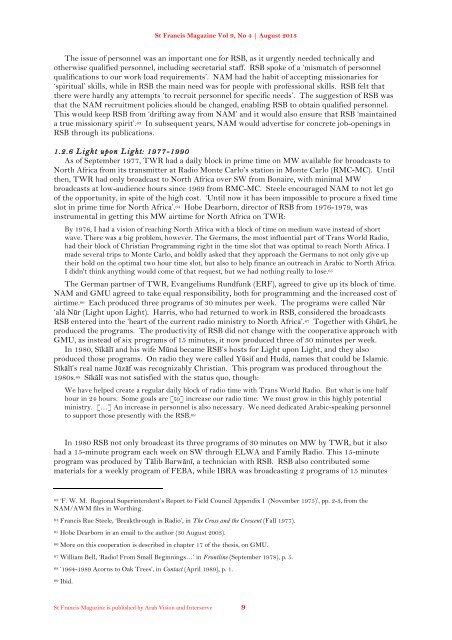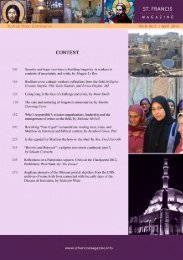Download the pdf - St.Francis Magazine
Download the pdf - St.Francis Magazine
Download the pdf - St.Francis Magazine
Create successful ePaper yourself
Turn your PDF publications into a flip-book with our unique Google optimized e-Paper software.
<strong>St</strong> <strong>Francis</strong> <strong>Magazine</strong> Vol 9, No 4 | August 2013<br />
The issue of personnel was an important one for RSB, as it urgently needed technically and<br />
o<strong>the</strong>rwise qualified personnel, including secretarial staff. RSB spoke of a ‘mismatch of personnel<br />
qualifications to our work load requirements’. NAM had <strong>the</strong> habit of accepting missionaries for<br />
‘spiritual’ skills, while in RSB <strong>the</strong> main need was for people with professional skills. RSB felt that<br />
<strong>the</strong>re were hardly any attempts ‘to recruit personnel for specific needs’. The suggestion of RSB was<br />
that <strong>the</strong> NAM recruitment policies should be changed, enabling RSB to obtain qualified personnel.<br />
This would keep RSB from ‘drifting away from NAM’ and it would also ensure that RSB ‘maintained<br />
a true missionary spirit’. 63 In subsequent years, NAM would advertise for concrete job-openings in<br />
RSB through its publications.<br />
1.2.6 Light upon Light: 1977-1990<br />
As of September 1977, TWR had a daily block in prime time on MW available for broadcasts to<br />
North Africa from its transmitter at Radio Monte Carlo’s station in Monte Carlo (RMC-MC). Until<br />
<strong>the</strong>n, TWR had only broadcast to North Africa over SW from Bonaire, with minimal MW<br />
broadcasts at low-audience hours since 1969 from RMC-MC. <strong>St</strong>eele encouraged NAM to not let go<br />
of <strong>the</strong> opportunity, in spite of <strong>the</strong> high cost. ‘Until now it has been impossible to procure a fixed time<br />
slot in prime time for North Africa’. 64 Hobe Dearborn, director of RSB from 1976-1979, was<br />
instrumental in getting this MW airtime for North Africa on TWR:<br />
By 1976, I had a vision of reaching North Africa with a block of time on medium wave instead of short<br />
wave. There was a big problem, however. The Germans, <strong>the</strong> most influential part of Trans World Radio,<br />
had <strong>the</strong>ir block of Christian Programming right in <strong>the</strong> time slot that was optimal to reach North Africa. I<br />
made several trips to Monte Carlo, and boldly asked that <strong>the</strong>y approach <strong>the</strong> Germans to not only give up<br />
<strong>the</strong>ir hold on <strong>the</strong> optimal two hour time slot, but also to help finance an outreach in Arabic to North Africa.<br />
I didn't think anything would come of that request, but we had nothing really to lose. 65<br />
The German partner of TWR, Evangeliums Rundfunk (ERF), agreed to give up its block of time.<br />
NAM and GMU agreed to take equal responsibility, both for programming and <strong>the</strong> increased cost of<br />
airtime. 66 Each produced three programs of 30 minutes per week. The programs were called Nūr<br />
‘alá Nūr (Light upon Light). Harris, who had returned to work in RSB, considered <strong>the</strong> broadcasts<br />
RSB entered into <strong>the</strong> ‘heart of <strong>the</strong> current radio ministry to North Africa’. 67 Toge<strong>the</strong>r with Ghūrī, he<br />
produced <strong>the</strong> programs. The productivity of RSB did not change with <strong>the</strong> cooperative approach with<br />
GMU, as instead of six programs of 15 minutes, it now produced three of 30 minutes per week.<br />
In 1980, Sīkālī and his wife Mūná became RSB’s hosts for Light upon Light, and <strong>the</strong>y also<br />
produced those programs. On radio <strong>the</strong>y were called Yūsif and Hudá, names that could be Islamic.<br />
Sīkālī’s real name Jūzāf was recognizably Christian. This program was produced throughout <strong>the</strong><br />
1980s. 68 Sīkālī was not satisfied with <strong>the</strong> status quo, though:<br />
We have helped create a regular daily block of radio time with Trans World Radio. But what is one half<br />
hour in 24 hours. Some goals are [to] increase our radio time. We must grow in this highly potential<br />
ministry. […] An increase in personnel is also necessary. We need dedicated Arabic-speaking personnel<br />
to support those presently with <strong>the</strong> RSB. 69<br />
In 1980 RSB not only broadcast its three programs of 30 minutes on MW by TWR, but it also<br />
had a 15-minute program each week on SW through ELWA and Family Radio. This 15-minute<br />
program was produced by Tālib Barwānī, a technician with RSB. RSB also contributed some<br />
materials for a weekly program of FEBA, while IBRA was broadcasting 2 programs of 15 minutes<br />
63 ‘F. W. M. Regional Superintendent’s Report to Field Council Appendix I (November 1975)’, pp. 2-3, from <strong>the</strong><br />
NAM/AWM files in Worthing.<br />
64 <strong>Francis</strong> Rue <strong>St</strong>eele, ‘Breakthrough in Radio’, in The Cross and <strong>the</strong> Crescent (Fall 1977).<br />
65 Hobe Dearborn in an email to <strong>the</strong> author (30 August 2003).<br />
66 More on this cooperation is described in chapter 17 of <strong>the</strong> <strong>the</strong>sis, on GMU.<br />
67 William Bell, ‘Radio! From Small Beginnings…’ in Frontline (September 1978), p. 5.<br />
68 ‘1964-1989 Acorns to Oak Trees’, in Contact (April 1989), p. 1.<br />
69 Ibid.<br />
<strong>St</strong> <strong>Francis</strong> <strong>Magazine</strong> is published by Arab Vision and Interserve 9







![Reflections on Surah Fatiha and the Lord's Prayer[1] - St.Francis ...](https://img.yumpu.com/49377951/1/184x260/reflections-on-surah-fatiha-and-the-lords-prayer1-stfrancis-.jpg?quality=85)









